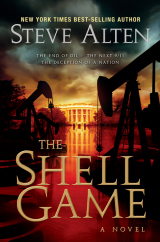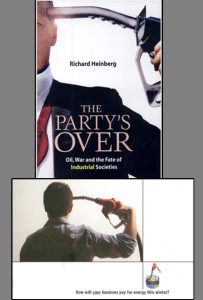 If you read political thrillers or action novels for their ability to transport you away from the concerns of current events into a fantasy that seems realistic but is purely fictional, then Steve Alten's book The Shell Game is probably not for you. And I wouldn't blame you; most folks probably don't want anxieties about their real lives and the future of our society to be a central part of the escapist action and adventure reading that we do on the beach. But after I heard that the book takes on the realities of peak oil, government corruption, American foreign policy and the political futures of today's Presidential candidates, and weaves them all into a 466 page novel, I couldn't help but be intrigued by it. Here's my review, some spoilers if you read on.
If you read political thrillers or action novels for their ability to transport you away from the concerns of current events into a fantasy that seems realistic but is purely fictional, then Steve Alten's book The Shell Game is probably not for you. And I wouldn't blame you; most folks probably don't want anxieties about their real lives and the future of our society to be a central part of the escapist action and adventure reading that we do on the beach. But after I heard that the book takes on the realities of peak oil, government corruption, American foreign policy and the political futures of today's Presidential candidates, and weaves them all into a 466 page novel, I couldn't help but be intrigued by it. Here's my review, some spoilers if you read on.
Continue reading "Steve Alten's The Shell Game"
Tag: books
This is interesting: former Economic Development Corporation of Wayne County President Don Holbrook, who was fired from the organization a few years ago in an unfortunate controversy, has released a self-published book about economic development tips and strategies. Titled "The Little Black Book of Economic Development," Holbrook says the book has information about the skills and resources needed to "create world class local economies that are both sustainable and transformational in nature." You can read an excerpt online. In his press release, Holbrook quotes reviews from economic and social strategists such as Rebecca Ryan (who visited Richmond in February 2006), and Richard Florida, author of the much celebrated book The Rise of the Creative Class.
Hmmm, I wonder if he "shared" about his experiences in Richmond in the book - perhaps for his sake and ours, let's hope not.
 I've blogged before about turning points in awareness of the issues that we face with regard to "the environment" and the energy crisis. Today I received a postcard in the mail with a photo of a man holding a gasoline pump nozzle up to his head, in an image that unavoidably evokes a suicide act in progress for most Westerners.
I've blogged before about turning points in awareness of the issues that we face with regard to "the environment" and the energy crisis. Today I received a postcard in the mail with a photo of a man holding a gasoline pump nozzle up to his head, in an image that unavoidably evokes a suicide act in progress for most Westerners.
I, having met Richard Heinberg and read his book The Party's Over: Oil, War and the Fate of Industrial Societies, of course presumed it was something related to addressing the impact of the end of abundant, cheap oil. The cover has a very similar image that complements the book's exploration of our relationship to oil. But when I visited the website that the postcard mysteriously directed me to, I found that it was an ad for...a credit card company. Their solution to the energy crisis? Gas credits when you make lots of charges on your card. You know we've reached a new level (high or low, I can't say) of public attention to the state of affairs when credit card companies think they can make a few dollars off of people who are worried about our dependence on oil.
If you're interested in a more effective approach than "going into debt for Mother Earth," you could join me at the upcoming Fourth Annual Conference on Peak Oil and Community Solutions, in Yellow Springs, Ohio, where Heinberg will be speaking. It's always a smashing good time, grounded in an accessible exploration of real community-based solutions.
Having some time to relax also meant lots of time to catch up on reading I've been meaning to do for a while now (though there's plenty more). Here's a quick run-through with my comments:
- The Secret Life of Bees by Sue Monk Kidd. A great, compelling story that is so rich and enjoyable. Reminds me of how I felt reading A Prayer for Owen Meany or To Kill a Mockingbird. I can also recommend Monk Kidd's The Dance of the Dissident Daughter.
- The Soul Tells A Story: Engaging Creativity With Spirituality In The Writing Life by Vinita Hampton Wright. I couldn't enjoy this one as much, perhaps because it seemed to define spirituality a little too differently than I do, and the resulting instructions/advice just didn't feel as applicable. It also wasn't as tightly structured as I would expect a book on creative writing to be.
- Secrets and Lies: Digital Security in a Networked World by Bruce Schneier. My review of Secrets and Lies is at the Summersault Weblog.
- The Golden Compass by Philip Pullman. Another really fun book that will appeal to fans of the "Narnia" and "Harry Potter" style of adventure-telling. Also coming out in December on the big screen as a motion picture starring Dakota Blue Richards and Daniel Craig - worth a see.
- The Assault on Reason by Al Gore. My review of The Assault on Reason is in my last weblog entry.
Now reading:
- Thinking Points: Communicating Our American Values and Vision and Whose Freedom?: The Battle Over America's Most Important Idea, both by George Lakoff. If you read this blog with any regularity, you already know I'm a fan of his stuff.
- Codes, Ciphers, Secrets and Cryptic Communication: Making and Breaking Sercet Messages from Hieroglyphocs to the Internet by Fred B. Wrixon. Nothing gets me up in the morning like a Bifid Cipher.
- The Woman and the Ape by Peter Hoeg. Highly recommended by Anna Lisa, and I've always enjoyed books with large primates as main characters.
I'll post reviews of these as I can. Your own reviews, recommendations and comments welcome!
 The tail end of the trip I just returned from took place in Nashville, TN and was charged with readings and viewings about the occupation of Iraq and the current political trends in Washington: I finished reading Nashville resident Al Gore's book The Assault on Reason and then later the same day, saw the new documentary film No End In Sight. The two tie together nicely, and so I have a review of them both here.
The tail end of the trip I just returned from took place in Nashville, TN and was charged with readings and viewings about the occupation of Iraq and the current political trends in Washington: I finished reading Nashville resident Al Gore's book The Assault on Reason and then later the same day, saw the new documentary film No End In Sight. The two tie together nicely, and so I have a review of them both here.
 I have a lot of memories of visiting zoos as a younger person. There was the time my Boy Scout troop had an overnight stay at the Cincinnati Zoo, where we had behind-the-scenes tours of the habitats and infrastructure that made up the place; I was amazed at the intricate facades created for zoo visitors. Another summer at the same zoo and I'm about to start drinking my red cream soda during a field trip lunch break, when a bird poops directly into it from a tree overhead. I remember feeling frustration and resentment that this creature had invaded my personal space so - now I laugh at the irony of that resentment, felt so strongly against one who was just answering the call of this artificial shrine to come observe animal life, poop and all. And most recently, standing with my nose and right hand pressed up against the glass at the Lincoln Park Zoo in Chicago, apologizing to the once-grand and beautiful Gorillas on display there for the noisy people, the cheesy layout of the captivity, the life stolen from them. "I'm so sorry," I mouthed. "Please forgive us."
I have a lot of memories of visiting zoos as a younger person. There was the time my Boy Scout troop had an overnight stay at the Cincinnati Zoo, where we had behind-the-scenes tours of the habitats and infrastructure that made up the place; I was amazed at the intricate facades created for zoo visitors. Another summer at the same zoo and I'm about to start drinking my red cream soda during a field trip lunch break, when a bird poops directly into it from a tree overhead. I remember feeling frustration and resentment that this creature had invaded my personal space so - now I laugh at the irony of that resentment, felt so strongly against one who was just answering the call of this artificial shrine to come observe animal life, poop and all. And most recently, standing with my nose and right hand pressed up against the glass at the Lincoln Park Zoo in Chicago, apologizing to the once-grand and beautiful Gorillas on display there for the noisy people, the cheesy layout of the captivity, the life stolen from them. "I'm so sorry," I mouthed. "Please forgive us."
I've had plenty of conversations about why most zoos maybe aren't such a good thing, about what they symbolize, what they mean about who we are as a people and a culture. But until I read Thought to Exist in the Wild: Awakening from the Nightmare of Zoos by Derrick Jensen and with photography by Karen Tweedy-Holmes, I hadn't really explored that symbolism and sense of concern in any depth. And to that end, the book is a thought-provoking and eye-opening treatment of the subject.
Continue reading "Derrick Jensen's Thought to Exist in the Wild"
There's a book meme going around, and Eric has tagged me. As he says, "a meme is an idea that spreads...Meme ideas spread by imitation, by exact copying and inexact copying. Memes can be melodies, catch-phrases, stories, clothing fashions, and ways of making pots. Many memes spread unintentionally in the course of casual conversation and story-telling. Bloggers deliberately spread some memes as ways to inspire new posts."
So, here I am, answering the questions from this book meme:
1. One book that changed your life?
Continue reading "Infected with a book meme"
I generally avoid national bestselling political books that are just consolidated accounts of the political soap operas that go on in our nation's capital, designed to make more buzz and more money for the journalists or whistle-blowers or former aides that happened to keep really good notes during the experience. But once in a while there are some pretty compelling publications that appear in that genre, and I can't help but dive in. Bob Woodward's Plan of Attack certainly emerges as an example of a page-turner for anyone interested in national politics, the executive branch's decision making process, and especially how the U.S. ended up invading Iraq.
Continue reading "Plan of Attack by Bob Woodward"
I'm having a really great time right now reading/listening to Bill Bryson's book A Short History of Nearly Everything. The book itself is very intriguing - a lively and engaging narrative of how our universe came to be and where it is now, the sciences and people who have explored those questions for so long, and the amazing oddities and subtleties about how our world works. It's a little geeky, but definitely written for non-geeks who want the Big Picture in the biggest sense of the word.
Continue reading "A Short History of Nearly Everything"
This analysis necessarily discusses some plot and thematic details of the book After Dachau by Daniel Quinn. I have made every attempt to refrain from revealing too much or spoiling the experience of reading the book for the first time, but picky readers be warned.
After reading just the first sentence of After Dachau, I was sure I had identified the major themes, direction, and message-delivering vehicle that Daniel Quinn would use in his new book. This was slightly comforting; I'd read that his latest work was radically different, obtuse, and unrelated to its predecessors. Given that his other books had significantly challenged the way I look at the world, and that I'd become (too) comfortable with that challenge, my initial reaction was my own attempt to tie everything together, to find central, comfortable ideas that I could hold onto, nod and agree with, and make my own.
But that, of course, is not the point. Quite the opposite, actually, and the book is anything but formulaic.
Continue reading "Review: Daniel Quinn's After Dachau"
